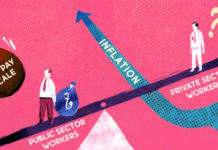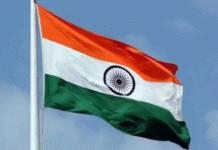How Punching Down Became a Way of Life in America
![]()

In this essay, I want to share with you a tiny theory of what it means to be American. It is up to you to judge, as ever, whether it carries any weight. All that I will say is that when I look around, it explains, a little, what I see.
Any theory of being American must explain one salient and striking fact: cruelty. America is the most cruel nation among its peers — even among most poor countries today. It is something like a new Rome. It has little, if any, functioning healthcare, education, transport, media, no safety nets, no stability, security. The middle class is collapsing, and life expectancy is falling. Young people die for a lack of insulin they cannot crowdfund. Elderly middle-class people live and die in their cars. Kids massacre each other in schools — when they’re not self-medicating the pain of it all away. The combination of these pathologies happens nowhere else — not a single place — in the world. Not even Pakistan, Costa Rica, or Rwanda. Hence, the world is aghast daily at the depths of American cruelty — yet somehow, they seem bottomless.
(Of course I don’t mean that all Americans are cruel. I just mean that in the same way we say countries, institutions, cultures have attitudes and dispositions, that there’s such a thing as a French or German national attitude or disposition, so, too there is an American one. Nor do I mean America is “the most cruel society in the world.” Can we really ever judge that? But it is uniquely cruel — a kind of special example — in weird, needless, and singular ways.)
Let me throw that into relief. Scandinavians are the happiest, longest-lived, and most prosperous people in the world because they do not punish one another constantly — but lift one another up. But Americans do not believe this reality. The underlying sentiment that unites America’s manifold problems is a myth of cruelty.
So. Where did the myth of cruelty come from? That is the question before us if we really want to understand America. I’ve wondered since I was a kid, to be honest. I thought, once, it was about capitalism, patriarchy, race, once. But now I think that while those are expressions of it, that something more primary, fundamental, and unique happened.
America was a strange, improbable combination of things, singular in history. A Promised Land — but one for the despised. Waves upon waves of them washed up on its shores. First, the Puritans, mocked and loathed in England. Then peasants and farmers and outlaws from across Europe. Then Chinese, Japanese, Latinos, and today, Muslims.
These emigrants all tended to share a common trait. They were at the very bottom, the lowest rung, of social and economic heirarchies in their own countries. All of them. That has changed a little recently — but America was founded by and for the despised, loathed, hated. People referred to as trash, nobodies, serfs, exiles, outcasts — who were never given an ounce of respect, dignity, or even belonging, in their societies of origin.
Let me make that clearer. We did not see nobles and landed gentry emigrate to America. British Lords and German Counts and Italian Barons. We saw German peasants, Irish villagers, Swedish farmers, the dwellers of Italian slums. People from the very lowest of heirarchies elsewhere, the oppressed and the subjugated, came to this Promised Land.
So first the English and French settlers supposed that this New World was theirs (and began a genocide against its natives, of course). But it wasn’t just the natives that they came to hate, for threatening their natural right to this Promised Land. It was the next waves of settlers, too. The English settlers hated the French. The French hated the Germans. They all hated the Irish. The Irish hated the Italians. And so on. That much is historical fact. Do you see the pattern forming yet?
This is very abstract, so let me make it concrete. Here came one wave of settlers — English. They dominated their way to the top of a hierarchy, above natives and blacks. Then came a new wave — German. They were punched down too — and began punching down — to bitterly establish themselves in this hierarchy, as high up as they could. Then another wave — Irish. Punched, punching down. All desperately vying for relative dominance among the rest.
You see, the crucial fact is that this didn’t happen elsewhere in the world — waves of settlers, all desperately trying to establish themselves above the next, last, most recent, in a hierarchy, all the more so, because they were despised, at the bottom, to begin with. In Europe, Asia, South America, heirarchies were long established — and broken only by revolution. America was the only nation where this constant reconstruction of hierarchy happened to such a degree, over and over again. Hence, the establishment of cruelty as a way of life — how else but to establish one’s self above the next wave of migrants?
Each new tribe that came to this Promised Land brought the burden of being despised, subjugated, oppressed, with them. They were finally above someone else in a social hierarchy. They were not at the bottom anymore. But to be above requires somone else to be below. And so there was a constant battle for relative position within a growing hierarchy — hence, dominance, competition, conquest soon became the prized cultural values, norms, and institutional goals. Cruelty as a way of life was born.
When we noted that the despised of England hated the newly arrived despised of France hated the newly arrived despised of Germany and so on, not to mentions natives, blacks, and Asians, in an endless vicious circle, we are also saying: America was learning to be cruel, by forever constructing greater heirachies to seize the fruits of a Promised Land. But greater hierarchies require greater cruelty to climb up, too. And the irony is that all this is what the despised came to America to escape.
(I’ll add peripheral point. The despised, when coming to a Promised Land, are the least likely, perversely, though we might not immediately think so, to want to share it — because they, at last, have something that they feel is theirs. Today’s servant wants to be tomorrow’s master. Today’s peasant wants to be tomorrow’s landlord. Today’s victim aspires to be tomorrow’s oppressor.)
Now. What was really happening here, in more modern terms? People were learning to “punch down,” as we might put it today. Americans were being taught to take out their anger, rage, and fear on those less powerful than them — usually, the most obvious and immediate ones they could find. An Irish mutt b*stard moved into the neighbourhood? Get them. No Chinamen allowed. Those Italians? We’ve got to move them out of our city. Intern those Japanese.
Punching down began to be institutionalized and normalized. Cruelty was becoming a way of life and a norm. Tribe after tribe of the despised fled to a Promised Land, but each one demanded their position above the last, having never had anything before. People who had been hated and outcast had status and belonging at last — but only by punching down the next wave. So no mechanisms ever really developed to allow the Promised Land to be shared wisely, well, or reasonably. Might became right.
Now, American leaders tried to intervene every now and then. FDR’s second bill of rights, JFK’s vision for a fairer society, and so on. But they were not very succesful — because they were fighting a history of cruelty that they did not really understand: one that went to the heart of what it means to be American itself. So they never really said: “Wait. What do we all really have in common, us Americans? We are the despised and mocked of history. Its outcasts and its exiles. This is what unites us! Let us stop punching down, then. Otherwise, what have we really learned? We are only repeating the very history of cruelty that we tried to escape from.”
How sad. How funny. Americans came to a Promised Land — but they could not escape themselves. Each new wave, trying to rise above the next, built a world even more cruel than the old one. Punching down, down, down, endlessly.
So, today, here we are. Punching down has become a national institution, a norm, and a way of life. School shootings? Can’t ban guns — let the kids have “active shooter drills.” We are punching all the way down to our little five years olds. Life expectancy falling? Can’t have healthcare — let them self-medicate with opioids. We are punching down to the poorest. Education cost a fortune? Too bad, take out debt. We are punching down to our young people. I could give you endless examples. But perhaps you get the point by now.
What does it mean to be American? To really “be” — see, feel, think, act American, so much so that you are not self-aware of it, because it is unconscious, reflexive, invisible, this way of “being”?
Well, it means what it always has. Punching down, not lifting up. Punching down is hardwired into America by now, thanks to a unique history of settlers — who had never had any — punching the next wave down for relative hierarchical position. An attitude of cruelty was born. And so today cruelty is the point of its institutions, the purpose of its norms, and the linchpin of its perverse idea of virtue, that by punishing people, we can better them. It is all that Americans expect from each other — and give to each other. That is the terrible burden of a Promised Land that history’s despised warred among one another for domination of.
The problem is this. A society of people punching one another down must collapse. What else could it do? It cannot rise, can it? If I am punching you down, and I am punching the next person down below me, how can anyone ever lift anyone up? But without lifting one another up, a society cannot grow in quantity or quality of life. This, too, is what happened to Soviet Russia.
America has never reckoned with its history of cruelty. Instead, it developed a defensive mythology of being welcoming — even while every new wave of immigrants had to fight, sometimes quite literally little street by street, against the last wave, for a piece of the Promised Land. Like all myths, that one — was a lie that revealed the truth: America was a Promised Land for the huddled masses to roam free — but only if they could fend off the other tribes, by punching them down, endlessly,.
A Promised Land is like a Garden of Eden. But who can live in the Garden peacefully but angels? Human beings, flawed, indelicate things, are only meant to be cast out — they are ever in conflict, in tension, hungry and ravenous. And that is never truer than for their most despised — who need to be healed most, or else will ravage their Gardens worst.
In this way, a Garden, given to the despised, is a war, waiting to happen. A war against itself. America is at just such a war, and has always been. The name of this war is cruelty. But the end of this war is not victory, but collapse.
I don’t say any of this to blame, shame, or judge. But only so that, perhaps, this history of violence can at last be reckoned with.
Umair
July 2021









